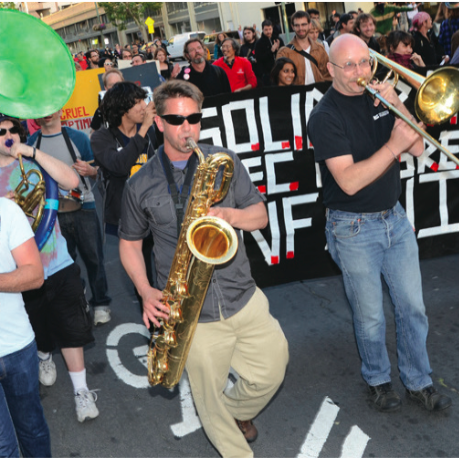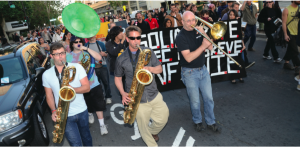
We need to focus more on persuasion, not puppets, pots and pans

When it comes to important negotiations, the pen may be mightier than the smooth sounds of a four-piece jazz ensemble • • • Photo by Daniel Arauz from Flickr
You probably heard about the “All Out Feb. 4th“ rally recently—the posters are all over Halifax. I consider myself a liberal person, but it doesn’t take a genius to know that this event is going to accomplish little if anything, and that those accomplishments will be the simple experience of making participating students feel more empowered.
Think I’m wrong? Take a look at the recent history of student protests. In Quebec during the 2012 protests, students ended up rioting, getting arrested, and driving the government to adopt controversial anti-protest laws that limited freedoms. They lost sight of their goals under crowd influence, and the protests only seemed to harden the Liberal government’s attitude and willingness to negotiate. While students ultimately achieved a tuition freeze later that year when Pauline Marois’s PQ government came to power, it would be wrong to suggest that this electoral victory was a result of the protests. Polls taken in the month before the protests began suggested that the Liberals were in danger of collapse and that the PQ was far enough ahead to flirt with a majority government. In the end, the PQ only managed to pull out a minority government with a nearly identical popular vote finish as the Liberals. Some pundits credited the PQ’s association with the student protests as being responsible for driving away many moderate voters. As a result of failing to achieve a majority, the PQ government never managed any real stability, and fell to a resurgent Liberal majority after only two years in power.
The Quebec protests were not unique. A similar situation unfolded in Brazil recently, except there were rumoured cases of police infiltrating those protests and actually inciting riots. The 2010 UK student protests made a lot of noise, but didn’t succeed in accomplishing any of their goals, which were eerily similar to the ones that our students planned to deal with on the 4th.
Mobs are the worst possible way for a group of intelligent and motivated young people to present their case. Policy makers grimace at the sight of them and instantly turn away. Police are brought in with force if the mob mentality gets out of hand.
Why does anyone think walking in large groups is somehow more significant than writing letters? Maybe because writing letters requires personal devotion and thought, whereas marching and yelling requires very little effort or self-education. I suppose protests also make for cool photo ops and the chance to print headlines that over-inflate the number of our constituency who actually take the time to form thoughtful opinions; “Ten thousand march in solidarity” does sound much more glorious than “a thousand letters sent to head office”.
Is this drive to protest a fetishization of anti-establishment thought? Probably. Students just get so frustrated at the perceived oppression by paper-pushing law makers that they feel the need to do something physically. Eventually their emotions crowd out the rational knowledge that most observers focus on the spectacle and don’t care to learn the details about what the mob wants, or that pursuing demands through mob action can only lead to change when all the stars align.
I feel for the students who believe in these protests. Debt goes up while quality of education stagnates. We’ve had recording technology for decades, and we haven’t figured out a way to cut down the enormous percentage of our education fees that go to paying for bodies and buildings—and that’s before even looking at our ever-bloating administrative costs. The system is really not treating students as the bright minds of the future, but as the coffers to draw from for their other undertakings.
But that’s all the more reason to go about these demonstrations in a smarter way. If you let your opponents generalize you as a mob, you lose all the passion of a scorned individual. When you gather in a faceless group, you open the gates to sabotage. If all of your hard work to gather apathetic students into a fury can be undone by a couple of disparaging interviews with less informed members of the crowd (or planted students, for that matter), it’s a sign that you’re relying on an outdated method of rebellion. Write letters to whomever in power you have an issue with. Hold information sessions. Don’t let our valid points get lost in the noise. Don’t start a public discussion about the actions of protesters—start one about the issues that matter. The right to speak persuasively and freely is one of our most precious democratic freedoms, and we would do well to exercise it in the most effective way possible.






